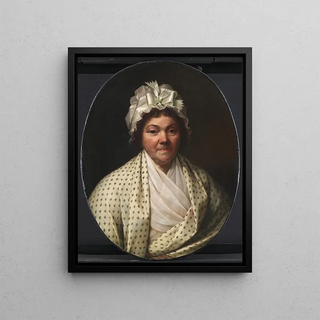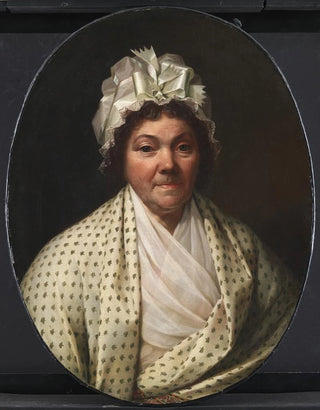Art print | Cecilie Marie Elisabeth Schouw née Bagge Poul Johan Schouw's wife - Jens Juel


View from behind

Frame (optional)
In the world of art, some works transcend the simple frame to become witnesses of an era, reflections of society. The art print of Cecilie Marie Elisabeth Schouw f. Bagge Poul Johan Schouws hustru - Jens Juel perfectly embodies this idea. This portrait, created by Jens Juel, celebrates a moment in a woman's life while capturing the very essence of her time. With psychological depth and finesse of execution, this piece invites the viewer to immerse themselves in the intimate universe of its model, while offering a glimpse into the social conventions of the 18th century. The presence of Cecilie Marie Elisabeth Schouw, wife of Poul Johan Schouw, in this composition, not only testifies to the artist's affection for his subject but also highlights the importance of women in Danish society of that era.
Style and uniqueness of the work
Jens Juel's style is distinguished by its striking realism and his ability to capture the nuances of human emotion. In this portrait, every detail matters: Cecilie’s sumptuous clothing, the delicate textures of her fabric, and the subtle expression on her face. Juel uses a palette of soft colors, creating an atmosphere that is both serene and introspective. The artist manages to establish a dialogue between the subject and the viewer, making the work lively and engaging. Cecilie’s slightly turned posture suggests a certain reserve, while also revealing inner strength. This blend of vulnerability and dignity is one of the major characteristics of his work, and this art print is no exception. In sum, the uniqueness of this portrait lies in its ability to tell a story, evoke emotions, while remaining rooted in impeccable pictorial technique.
The artist and his influence
Jens Juel, a Danish painter of the 18th century, is often regarded as one of the pioneers of modern portraiture in Scandinavia. His career is marked by an exploration of themes of identity and representation, concerns that still resonate today. Juel managed to establish himself in an evolving artistic environment, where the transition between

Matte finish

View from behind

Frame (optional)
In the world of art, some works transcend the simple frame to become witnesses of an era, reflections of society. The art print of Cecilie Marie Elisabeth Schouw f. Bagge Poul Johan Schouws hustru - Jens Juel perfectly embodies this idea. This portrait, created by Jens Juel, celebrates a moment in a woman's life while capturing the very essence of her time. With psychological depth and finesse of execution, this piece invites the viewer to immerse themselves in the intimate universe of its model, while offering a glimpse into the social conventions of the 18th century. The presence of Cecilie Marie Elisabeth Schouw, wife of Poul Johan Schouw, in this composition, not only testifies to the artist's affection for his subject but also highlights the importance of women in Danish society of that era.
Style and uniqueness of the work
Jens Juel's style is distinguished by its striking realism and his ability to capture the nuances of human emotion. In this portrait, every detail matters: Cecilie’s sumptuous clothing, the delicate textures of her fabric, and the subtle expression on her face. Juel uses a palette of soft colors, creating an atmosphere that is both serene and introspective. The artist manages to establish a dialogue between the subject and the viewer, making the work lively and engaging. Cecilie’s slightly turned posture suggests a certain reserve, while also revealing inner strength. This blend of vulnerability and dignity is one of the major characteristics of his work, and this art print is no exception. In sum, the uniqueness of this portrait lies in its ability to tell a story, evoke emotions, while remaining rooted in impeccable pictorial technique.
The artist and his influence
Jens Juel, a Danish painter of the 18th century, is often regarded as one of the pioneers of modern portraiture in Scandinavia. His career is marked by an exploration of themes of identity and representation, concerns that still resonate today. Juel managed to establish himself in an evolving artistic environment, where the transition between






